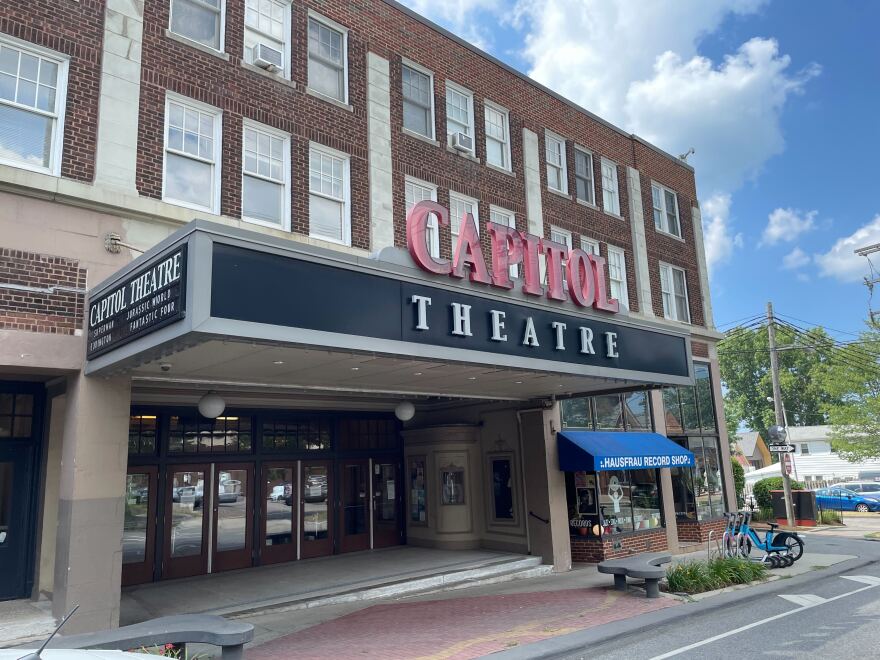Cleveland's only West Side movie theater is hoping to rewrite the plot of the last few years.
The Capitol Theatre's owners, Northwest Neighborhoods Community Development Corporation, last month launched an advisory committee to steward the theater after years of dwindling audiences.
The Capitol Theatre was originally a thriving vaudeville and silent movie film house in the 1920s before falling into derelict conditions by the 1980s. For decades, the building was in disrepair before a $7 million transformation revitalized the theater in 2009.
That was made possible, in part, by a $1.5 million loan by the city of Cleveland - which has yet to be repaid.
Since the renovation, Gordon Square Arts District in Cleveland's Detroit-Shoreway neighborhood exploded with dining, coffee shops, retail and, of course, arts. Akshay Kalra, the economic coordinator of Northwest Neighborhoods CDC, credits much of that growth — and the artistic identity of the Square — to anchor institutions like the Capitol, as well as other arts organizations like Near West Theatre and Cleveland Public Theatre located on Detroit Avenue.
"The neighborhood has been known for more things, like we have some really great coffee shops, we've got some great restaurants, but it was really those first anchor institutions," Kalra said. "So to maintain those sort of historical assets, in my opinion, it's to sort of maintain the soul of the neighborhood."
But now, the Capitol Theatre is facing a problem shared by many theaters across the country: difficulty attracting audiences back to the movies post-pandemic.
Total movie theater admissions in the U.S. were 800 million in 2024: down from 1.3 billion before the COVID-19 pandemic, according to the New York Times. That's in part because of pushed release dates from the pandemic, strikes that shut down filmmaking for much of 2023 and at-home streaming options.
About 6,000 theaters in the U.S. have closed in the last five years.
"The challenges that the Capitol faces are not unique specifically to the Capitol," Kalra said. "So it's a matter of getting people in the door and getting people to see the movies because when they see a movie at the Capitol, they become very ride or die for the Capitol."
An added challenge, Kalra said, is that unlike other privately-owned theater chains, the Capitol is owned by a community development corporation. He said no one at the organization has any theater experience: that's where the stewardship board comes in.
"We wanted to make sure that we built the capacity with experts from all around the city and even from a bit outside the city," Kalra said. "Everyone on this board has love for the Capitol and love for historic movie theaters. And many of them have really relevant experience for the work that we don't want to do: there's lawyers, there's people with experience running historic theaters, people who know how to market things, how to fundraise."
The Capitol Theatre costs half a million dollars to operate. Cleveland Cinemas, which is contracted to operate the theater, told Ideastream the Capitol had between 30,000 to 35,000 visitors last year. That's down from the 50,000 reported in 2016 by Cleveland.com: half of what the theater was projected to bring in each year.
Cleveland Cinemas said last year was an improvement over the preceding post-pandemic years, however, the stewardship board's chair and Northwest Neighborhood CDC board member Nina Holzer said long-term sustainability is needed.
"Some of the things that we're looking at is brainstorming: are there event opportunities that we could be capitalizing on and to bring more folks in the door?" Holzer said. "Are there partnerships within the neighborhood that could better be leveraged, put in place and leveraged to bring more people on the door?"
Kalra and Holzer imagine more programming beyond just movies. Kalra pointed to the success of a recent screening of "Superman," the James Gunn blockbuster that was partially filmed in Cleveland. That event featured a talkback with Brian Michael Bendis, a native Clevelander and "Superman" writer, and an afterparty at the neighboring Superelectric Pinball Parlor.
"It's about figuring out, like, what do we not even know that we don't know?" Kalra said. "So we're looking into sort of leaning into those things that. I'm pretty buzzed and excited for the future of the Capitol."



